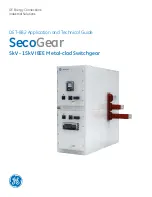
Functions
2.6 Circuit-Breaker Failure Protection 50BF
SIPROTEC, 7SD80, Manual
E50417-G1140-C474-A1, Release date 09.2011
102
Figure 2-35
Simplified function diagram of circuit-breaker failure protection controlled by circuit-breaker
auxiliary contact
Monitoring the Current Flow
Each of the phase currents and an additional plausibility current (see below) are filtered by numerical filter al-
gorithms so that only the fundamental component is used for further evaluation.
Special measures are taken in order to detect a current interruption. In case of sinusoidal currents the current
interruption is detected after approximately 10 ms. With aperiodic DC current components in the fault current
and/or in the current transformer secondary circuit after interruption (e.g. current transformers with linearized
core), or saturation of the current transformers caused by the DC component in the fault current, it can take
one AC cycle before the interruption of the primary current is reliably detected.
The currents are monitored and compared with the set limit value. Besides the three phase currents, two addi-
tional current thresholds are provided in order to allow a plausibility check. For this plausibility check, a separate
threshold value can be used if the configuration is made accordingly (see Figure 2-36).
As plausibility current, the ground current (residual current
I
E
(3·
I
0
) is preferably used. If the residual current
from the neutral of the current transformer set is connected to the device it is used. If the residual current is not
available, the device calculates it with the formula:
3·
I
0
=
I
A
+
I
B
+
I
C
Additionally, the value calculated by 7SD80 of three times the negative sequence current 3·
I
2
is used for plau-
sibility check. This is calculated according to the equation:
3·
I
2
=
I
A
+ a
2
·
I
B
+ a·
I
C
where
a = e
j120°.
These plausibility currents do not have any direct influence on the basic function of the breaker failure protec-
tion but they allow a plausibility check that at least two current thresholds must be exceeded before any of the
time delays are started.
In case of high-resistance ground faults, it can happen that the ground current exceeds the sensitive threshold
value
50NBF PICKUP
(address
3912
) whereas the phase current involved in the short circuit does not exceed
the threshold value
50BF PICKUP
(address
3902
). The plausibility check would prevent the start of the breaker
failure protection. In this case, the pickup threshold of the phase current monitoring
50BF PICKUP
can be
switched to the threshold value
50NBF PICKUP
. Use the binary input 1404
„>50BF 3I0>“
for this purpose.
This binary input is linked to an external signal that is suggestive of a high-resistance fault, e.g. ground fault or
displacement voltage detected. The ground current threshold that is set more sensitive is thus also used for
monitoring the phase currents (Figure 2-36).














































